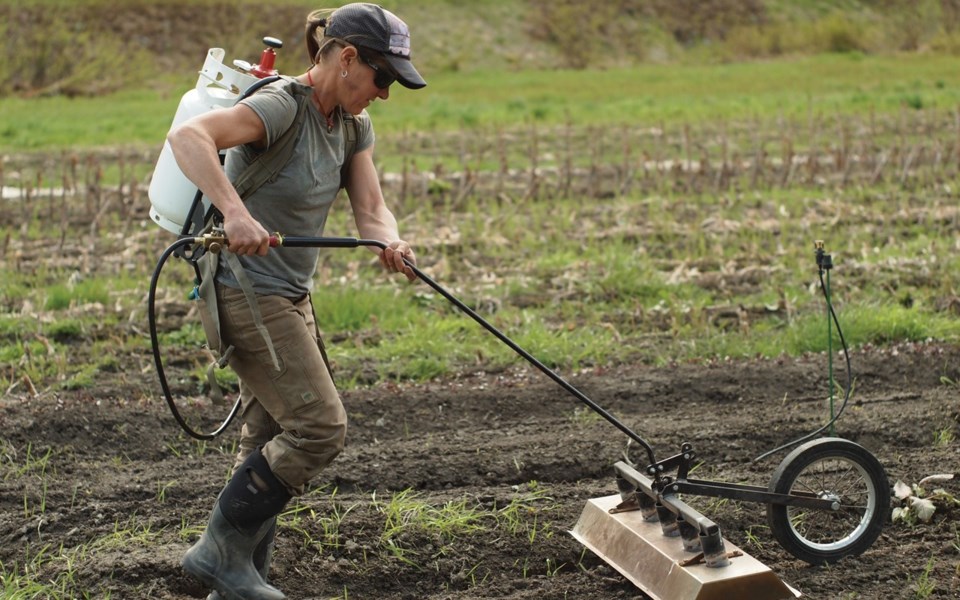So how's it going there, bud? Still hunkered down? Waitin' till you're down to beans and rice before you venture out to the grocery store because everything's so strange? The paranoia, the frustration—anger, even.
It all feels so fraught, as we take hours to shop for what used to take minutes.
Yep, grocery shopping, along with a long litany, ain't much fun these days. And it's nobody's fault. Not the still-smiling cashiers behind their plexiglass barriers, who deserve danger pay. Not the poor clerks trying to keep the shelves stocked with whatever. Not the earnest security guards managing all us crazed Coviphobics.
And it's no fault of our upside-down supply chains. Never mind T.P. and hand sanitizers. Flour factories can't get enough packaging materials, some meat-packing plants are shuttered, and farms all over can't access their usual truckers, packers or pickers. Picture all that lovely, unpicked asparagus in Similkameen Valley going to waste.
We can't always get what we want. And when we try sometimes, we can't even get what we need. (Five stores and counting, here, for baking powder.)
The New Yorker says the coronavirus is rewriting our imaginations. That includes rewriting how we imagine our food supply, and our conjoined, post-COVIDian future.
Chris Quinlan, former Whistler Farmers' Market manager and president/founder of Marketwurks.com, points out that saying the landscape for farmers' markets has changed since February is like saying drinking bleach might hurt you. So how have they adapted?
Quite well, it seems: The motivation to have our farmers' markets operate has never been higher to demonstrate the essential part of farmers' markets, says Heather O'Hara, executive director for the B.C. Association of Farmers' Markets, in a Vimeo interview with Chris.
"What's the core essence of a farmers' market?" she asks. "It really is just to support local farmers and food entrepreneurs." Which doesn't discount the fact that all the activities and social community aspects of farmers' markets are really important.
"But, right now, in the absence of being able to do those things ... it's a good reminder to us, as a sector, and also to policy-makers, to go, oh yeah, right, [farmers' markets] are an essential service. They are important, and they even become more important as the more conventional, more industrial-sized agricultural system is starting to get tested..."
To that end, you'll be happy to hear that even with all the reimagining required, Squamish Farmers' Market will be open every Saturday, starting May 9; Whistler Farmers' Market will open on Father's Day (see Brandon Barrett's April 6 article in Pique); and the award-winning Pemberton Farmers' Market will be up and running every Friday, 3 p.m., starting June 5 in beautiful downtown Pemberton.
"We're still planning the first Pemberton Farmers' Market... although 'planning' is an optimistic term as guidelines are constantly updating and it's challenging to keep our vendors informed and on board," writes Eileen Keenan from her home in Birken, where she runs a bakery from 100-plus-year-old Birken House, which stands on the site of an old, gold-rush stagecoach stop. There they're enjoying kale, leeks and carrots that overwintered, and happily expanding the berry patches, anticipating lots of pie demand this summer.
"There's been a big push towards online sales, which is proving to be challenging ... The concept of a farmers' market where people are discouraged from lingering is strange to us," she said.
For now, Birken House Bakery is open Saturday mornings for people to safely pick up the yummy macaroons or fresh bread you pre-ordered online. Still a good way to catch up on local gossip, too.
They're doing much the same at Rootdown certified organic farm in Pemberton Valley—flexing, innovating, contending—for doing more with less has been their motto for years.
Rootdown co-owner/farmer, Simone McIsaac, and crew have been getting the transplants out of the greenhouses and into the fields—and into our hands. Planting and growing things right now is a surefire way to stay sane, and eat what you like.
Rootdown has been good to Whistler's restaurant community, supplying chefs with specialty items like squash blossoms, and they're trying to stay supportive. But with so much in the service industry upended, they're branching out and innovating, given half their income traditionally comes from restos.
Yes, you can still order a Rootdown harvest box, while 2,000 young veggie transplants in 20-plus varieties—including Simone's favourite tomatoes, sweet Washington cherries, and mine, Black Krims—are ready for our imaginings. You just order the transplants you want online, then pick them up safely May 9 or 16. (Don't procrastinate—some varieties have already sold out!)
All very innovative; sometimes trying, even scary—and all causing us to reimagine. As Simone says, it seems like these times have great potential to move us in different ways.
"I think people are having a big shake-up..." she says. "We live in a privileged world where we can get anything at any time, and we have been. Now this is rocking the foundation of that. If you look at the global perspective on things... it's just nice we're getting a little of that real-world perspective that you can't have anything you want any time you want it.
"Everybody's making sacrifices."
Eileen sees potential, too: "My biggest fear is actually that things will go 'back to normal.' I feel we've been offered a unique opportunity to pivot our economy and our lifestyles to address the challenge of climate change, and if we don't do it now, we never will."
Glenda Bartosh is an award-winning journalist who's now a raccoon—washing my hands and wearing a mask.




